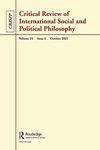Is political realism barren?: normativity and story-telling
IF 1
Q3 POLITICAL SCIENCE
Critical Review of International Social and Political Philosophy
Pub Date : 2022-09-06
DOI:10.1080/13698230.2022.2120658
引用次数: 0
Abstract
ABSTRACT Political realism has been criticised for its methodological claims about normativity and for its criticisms of moralism. Realists themselves should be more concerned that for all its methodological wrangling, realists have struggled to produce much positive theorising, rendering realism barren. I argue that realism, in both its liberal and radical forms, is currently barren in the sense of being unproductive, and show how the two dominant forms of realism are barren in different ways. Bernard Williams’s liberal realism exclusively derives its normative resources from existing political practices, values, and institutions, which leads it to replicate the status quo and precludes external criticism. Radical realism, represented here by Raymond Geuss, is barren because the fear of succumbing to moralism or ‘normativism’ leads radical realists to wrongly abjure normativity altogether. Having shown that both forms of realism are barren I argue that radical realists should adopt a method of political theory as story-telling as a way to avoid both moralism and barrenness. While realists are right to be wary of normative prescription, I argue that realists need to tell a story about which political transformations are desirable and why or else risk succumbing barrenness. I give a brief illustration of story-telling in practice then address some objections to story-telling as a productive method.政治现实主义是贫瘠的吗?:规范性和讲故事
政治现实主义因其关于规范性的方法论主张和对道德主义的批评而受到批评。现实主义者自己应该更关心的是,尽管在方法论上争论不休,但现实主义者一直在努力提出许多积极的理论,使现实主义变得贫瘠。我认为现实主义,无论是自由主义形式还是激进主义形式,目前都是贫瘠的,因为没有生产力,并展示了两种主要形式的现实主义是如何以不同的方式贫瘠的。伯纳德·威廉姆斯的自由现实主义完全从现有的政治实践、价值观和制度中获取规范性资源,这导致它复制现状并排除外部批评。以雷蒙德·高斯为代表的激进现实主义是贫瘠的,因为害怕屈服于道德主义或“规范主义”,导致激进现实主义者错误地放弃了规范主义。在证明了两种形式的现实主义都是贫瘠的之后,我认为激进的现实主义者应该采用一种政治理论的方法来讲述故事,以此来避免道德主义和贫瘠。虽然现实主义者对规范性处方的警惕是正确的,但我认为,现实主义者需要讲述一个故事,说明哪些政治变革是可取的,以及为什么这样做,否则就有可能陷入贫瘠。我简要介绍了讲故事的实践,然后提出了一些反对意见,认为讲故事是一种富有成效的方法。
本文章由计算机程序翻译,如有差异,请以英文原文为准。
求助全文
约1分钟内获得全文
求助全文
来源期刊

Critical Review of International Social and Political Philosophy
POLITICAL SCIENCE-
CiteScore
1.60
自引率
0.00%
发文量
74
 求助内容:
求助内容: 应助结果提醒方式:
应助结果提醒方式:


